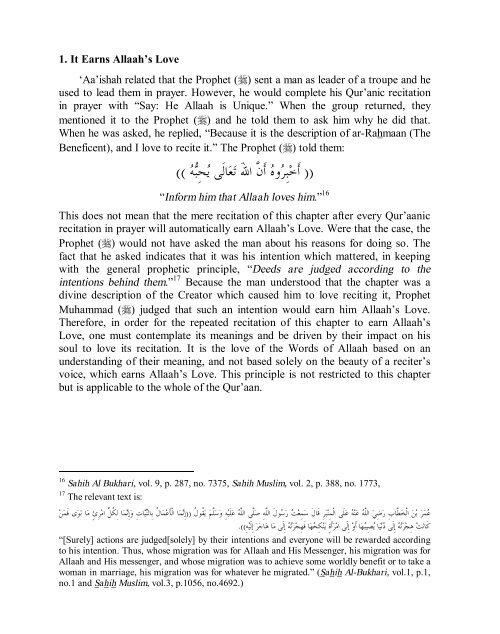You also want an ePaper? Increase the reach of your titles
YUMPU automatically turns print PDFs into web optimized ePapers that Google loves.
1. It Earns Allaah’s Love<br />
‘Aa’ishah related that the Prophet (r) sent a man as leader of a troupe and he<br />
used to lead them in prayer. However, he would complete his Qur’anic recitation<br />
in prayer with “Say: He Allaah is Unique.” When the group returned, they<br />
mentioned it to the Prophet (r) and he told them to ask him why he did that.<br />
When he was asked, he replied, “Because it is the description of ar-Rahmaan (The<br />
Beneficent), and I love to recite it.” The Prophet (r) told them:<br />
(( أ َخبِروه أ َن َّ االلهَ تعال َى يحِبه ))<br />
“Inform him that Allaah loves him.” 16<br />
This does not mean that the mere recitation of this chapter after every Qur’aanic<br />
recitation in prayer will automatically earn Allaah’s Love. Were that the case, the<br />
Prophet (r) would not have asked the man about his reasons for doing so. The<br />
fact that he asked indicates that it was his intention which mattered, in keeping<br />
with the general prophetic principle, “Deeds are judged according to the<br />
intentions behind them.” 17 Because the man understood that the chapter was a<br />
divine description of the Creator which caused him to love reciting it, Prophet<br />
Muhammad (r) judged that such an intention would earn him Allaah’s Love.<br />
Therefore, in order for the repeated recitation of this chapter to earn Allaah’s<br />
Love, one must contemplate its meanings and be driven <strong>by</strong> their impact on his<br />
soul to love its recitation. It is the love of the Words of Allaah based on an<br />
understanding of their meaning, and not based solely on the beauty of a reciter’s<br />
voice, which earns Allaah’s Love. This principle is not restricted to this chapter<br />
but is applicable to the whole of the Qur’aan.<br />
16 Sahih Al Bukhari, vol. 9, p. 287, no. 7375, Sahih Muslim, vol. 2, p. 388, no. 1773,<br />
17 The relevant text is:<br />
عمر بن ال ْخط َّابِ رضِي الل َّه عنه عل َى ال ْمِنبرِ ق َال َ سمِعت رسول َ الل َّهِ صل َّى الل َّه عل َيهِ وسل َّم يق ُول ُ ((إِنما ال ْأ َعمال ُ بِالنياتِ وإِنما لِك ُل ِّ امرِئٍ ما نوى ف َمن<br />
ك َانت هِجرته إِل َى دنيا يصِيبها أ َو إِل َى امرأ َةٍ ينكِحها ف َهِجرته إِل َى ما هاجر إِل َيهِ)).<br />
“[Surely] actions are judged[solely] <strong>by</strong> their intentions and everyone will be rewarded according<br />
to his intention. Thus, whose migration was for Allaah and His Messenger, his migration was for<br />
Allaah and His messenger, and whose migration was to achieve some worldly benefit or to take a<br />
woman in marriage, his migration was for whatever he migrated.” (Sahih Al-Bukhari, vol.1, p.1,<br />
no.1 and Sahih Muslim, vol.3, p.1056, no.4692.)














